MEDICATION ERRORS: Causes, Effects, and Minimization Strategies
VerifiedAdded on 2022/09/28
|6
|1534
|30
Report
AI Summary
This report delves into the critical issue of medication errors within healthcare, defining them as preventable actions leading to incorrect drug use or patient harm. It identifies several key causes, including inadequate information flow, poor communication among healthcare staff, technical failures of medical equipment, poor workflow and staffing patterns, and human-related errors such as failure to adhere to established nursing procedures. The report explores the adverse emotional impacts on healthcare providers, including feelings of guilt and anxiety, as well as the potential for job loss and legal repercussions. It also details the serious consequences for patients, ranging from temporary complications like skin reactions to permanent disabilities and even death. To mitigate these risks, the report emphasizes the importance of comprehensive patient information documentation using electronic health records and effective medication management systems, adhering to medication safety standards. The report also suggests that health care centers should ensure there is effective supply chain in the safe delivery of medicines and that there should be up to date medicine related information to reduce medication errors.
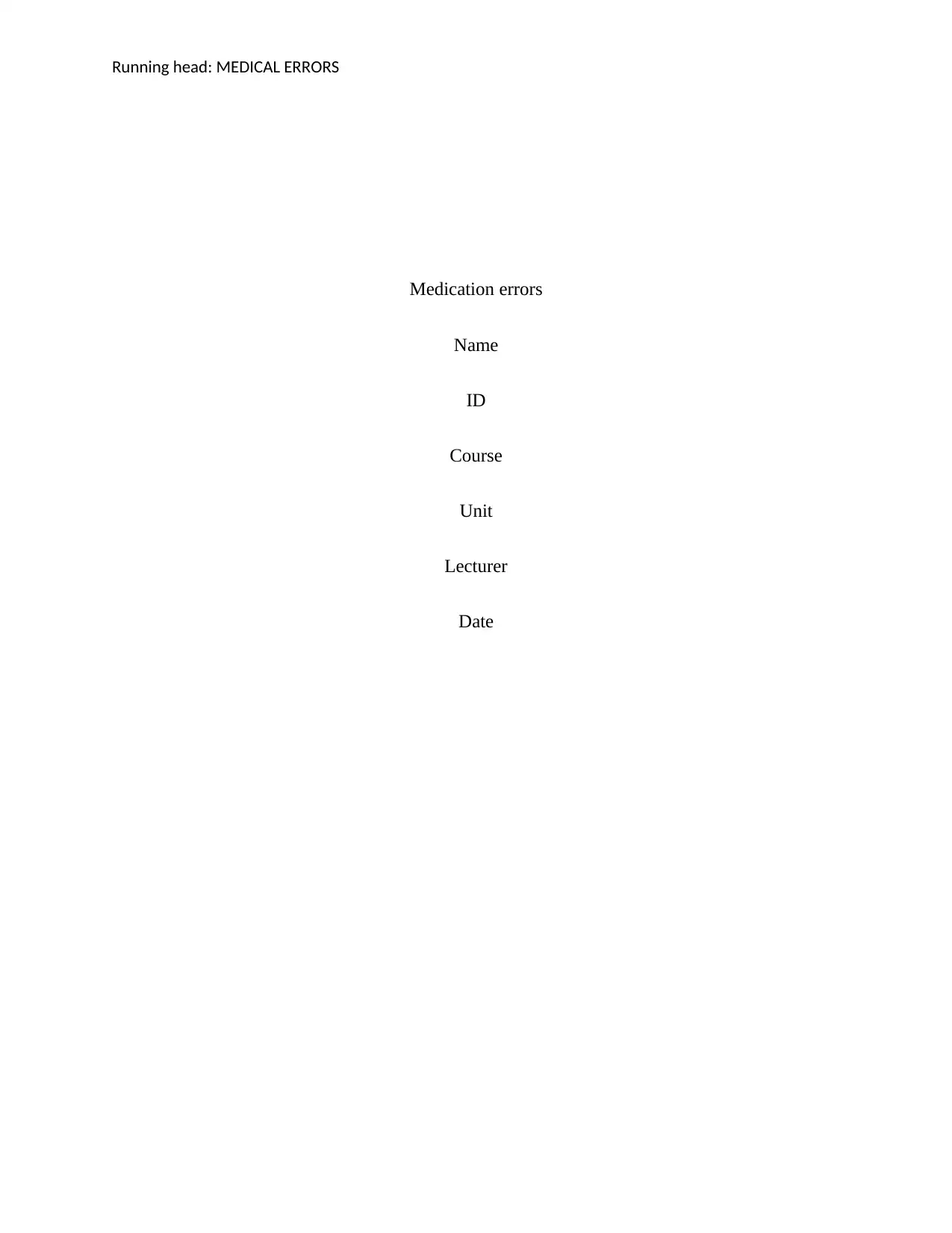
Running head: MEDICAL ERRORS
Medication errors
Name
ID
Course
Unit
Lecturer
Date
Medication errors
Name
ID
Course
Unit
Lecturer
Date
Paraphrase This Document
Need a fresh take? Get an instant paraphrase of this document with our AI Paraphraser
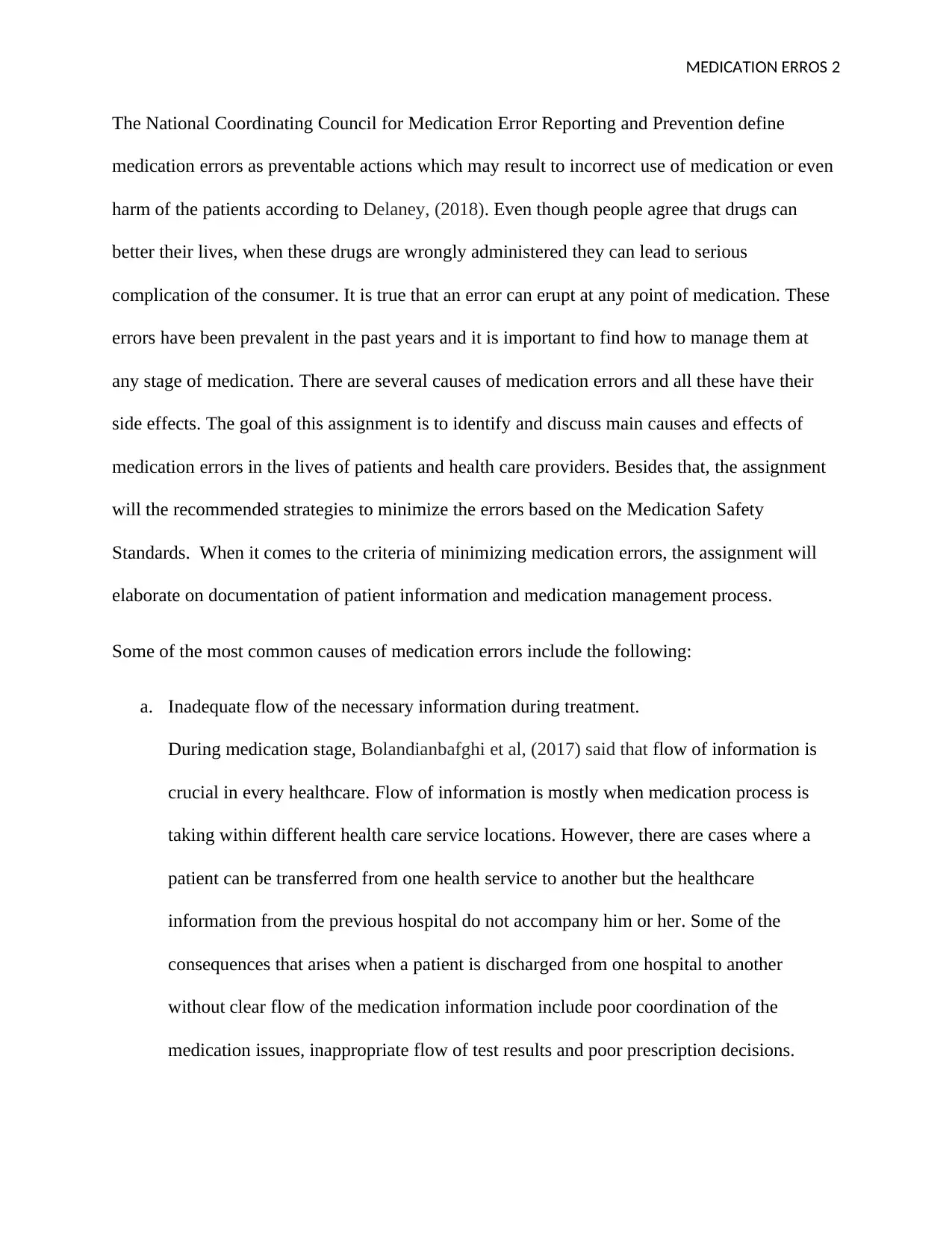
MEDICATION ERROS 2
The National Coordinating Council for Medication Error Reporting and Prevention define
medication errors as preventable actions which may result to incorrect use of medication or even
harm of the patients according to Delaney, (2018). Even though people agree that drugs can
better their lives, when these drugs are wrongly administered they can lead to serious
complication of the consumer. It is true that an error can erupt at any point of medication. These
errors have been prevalent in the past years and it is important to find how to manage them at
any stage of medication. There are several causes of medication errors and all these have their
side effects. The goal of this assignment is to identify and discuss main causes and effects of
medication errors in the lives of patients and health care providers. Besides that, the assignment
will the recommended strategies to minimize the errors based on the Medication Safety
Standards. When it comes to the criteria of minimizing medication errors, the assignment will
elaborate on documentation of patient information and medication management process.
Some of the most common causes of medication errors include the following:
a. Inadequate flow of the necessary information during treatment.
During medication stage, Bolandianbafghi et al, (2017) said that flow of information is
crucial in every healthcare. Flow of information is mostly when medication process is
taking within different health care service locations. However, there are cases where a
patient can be transferred from one health service to another but the healthcare
information from the previous hospital do not accompany him or her. Some of the
consequences that arises when a patient is discharged from one hospital to another
without clear flow of the medication information include poor coordination of the
medication issues, inappropriate flow of test results and poor prescription decisions.
The National Coordinating Council for Medication Error Reporting and Prevention define
medication errors as preventable actions which may result to incorrect use of medication or even
harm of the patients according to Delaney, (2018). Even though people agree that drugs can
better their lives, when these drugs are wrongly administered they can lead to serious
complication of the consumer. It is true that an error can erupt at any point of medication. These
errors have been prevalent in the past years and it is important to find how to manage them at
any stage of medication. There are several causes of medication errors and all these have their
side effects. The goal of this assignment is to identify and discuss main causes and effects of
medication errors in the lives of patients and health care providers. Besides that, the assignment
will the recommended strategies to minimize the errors based on the Medication Safety
Standards. When it comes to the criteria of minimizing medication errors, the assignment will
elaborate on documentation of patient information and medication management process.
Some of the most common causes of medication errors include the following:
a. Inadequate flow of the necessary information during treatment.
During medication stage, Bolandianbafghi et al, (2017) said that flow of information is
crucial in every healthcare. Flow of information is mostly when medication process is
taking within different health care service locations. However, there are cases where a
patient can be transferred from one health service to another but the healthcare
information from the previous hospital do not accompany him or her. Some of the
consequences that arises when a patient is discharged from one hospital to another
without clear flow of the medication information include poor coordination of the
medication issues, inappropriate flow of test results and poor prescription decisions.
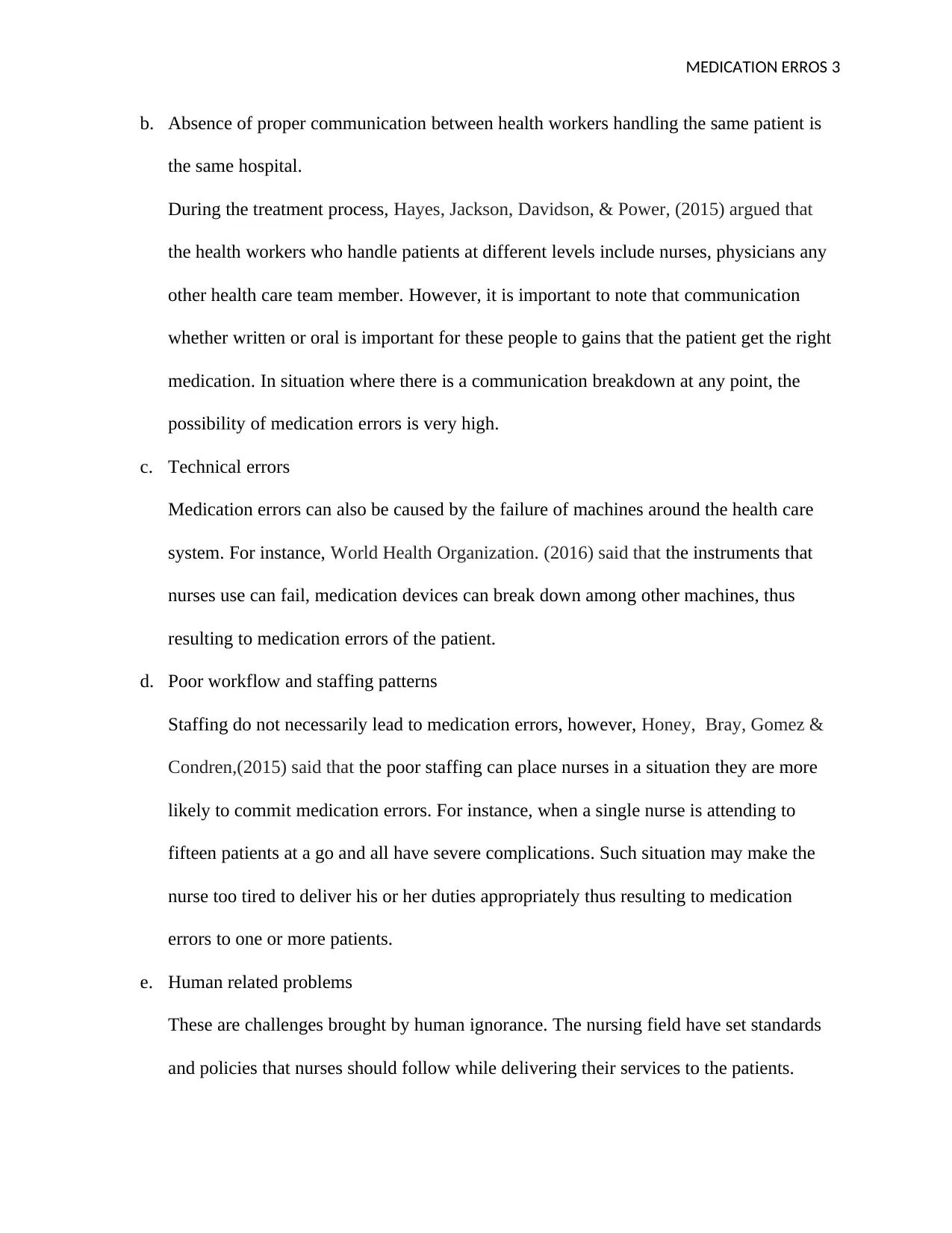
MEDICATION ERROS 3
b. Absence of proper communication between health workers handling the same patient is
the same hospital.
During the treatment process, Hayes, Jackson, Davidson, & Power, (2015) argued that
the health workers who handle patients at different levels include nurses, physicians any
other health care team member. However, it is important to note that communication
whether written or oral is important for these people to gains that the patient get the right
medication. In situation where there is a communication breakdown at any point, the
possibility of medication errors is very high.
c. Technical errors
Medication errors can also be caused by the failure of machines around the health care
system. For instance, World Health Organization. (2016) said that the instruments that
nurses use can fail, medication devices can break down among other machines, thus
resulting to medication errors of the patient.
d. Poor workflow and staffing patterns
Staffing do not necessarily lead to medication errors, however, Honey, Bray, Gomez &
Condren,(2015) said that the poor staffing can place nurses in a situation they are more
likely to commit medication errors. For instance, when a single nurse is attending to
fifteen patients at a go and all have severe complications. Such situation may make the
nurse too tired to deliver his or her duties appropriately thus resulting to medication
errors to one or more patients.
e. Human related problems
These are challenges brought by human ignorance. The nursing field have set standards
and policies that nurses should follow while delivering their services to the patients.
b. Absence of proper communication between health workers handling the same patient is
the same hospital.
During the treatment process, Hayes, Jackson, Davidson, & Power, (2015) argued that
the health workers who handle patients at different levels include nurses, physicians any
other health care team member. However, it is important to note that communication
whether written or oral is important for these people to gains that the patient get the right
medication. In situation where there is a communication breakdown at any point, the
possibility of medication errors is very high.
c. Technical errors
Medication errors can also be caused by the failure of machines around the health care
system. For instance, World Health Organization. (2016) said that the instruments that
nurses use can fail, medication devices can break down among other machines, thus
resulting to medication errors of the patient.
d. Poor workflow and staffing patterns
Staffing do not necessarily lead to medication errors, however, Honey, Bray, Gomez &
Condren,(2015) said that the poor staffing can place nurses in a situation they are more
likely to commit medication errors. For instance, when a single nurse is attending to
fifteen patients at a go and all have severe complications. Such situation may make the
nurse too tired to deliver his or her duties appropriately thus resulting to medication
errors to one or more patients.
e. Human related problems
These are challenges brought by human ignorance. The nursing field have set standards
and policies that nurses should follow while delivering their services to the patients.
⊘ This is a preview!⊘
Do you want full access?
Subscribe today to unlock all pages.

Trusted by 1+ million students worldwide
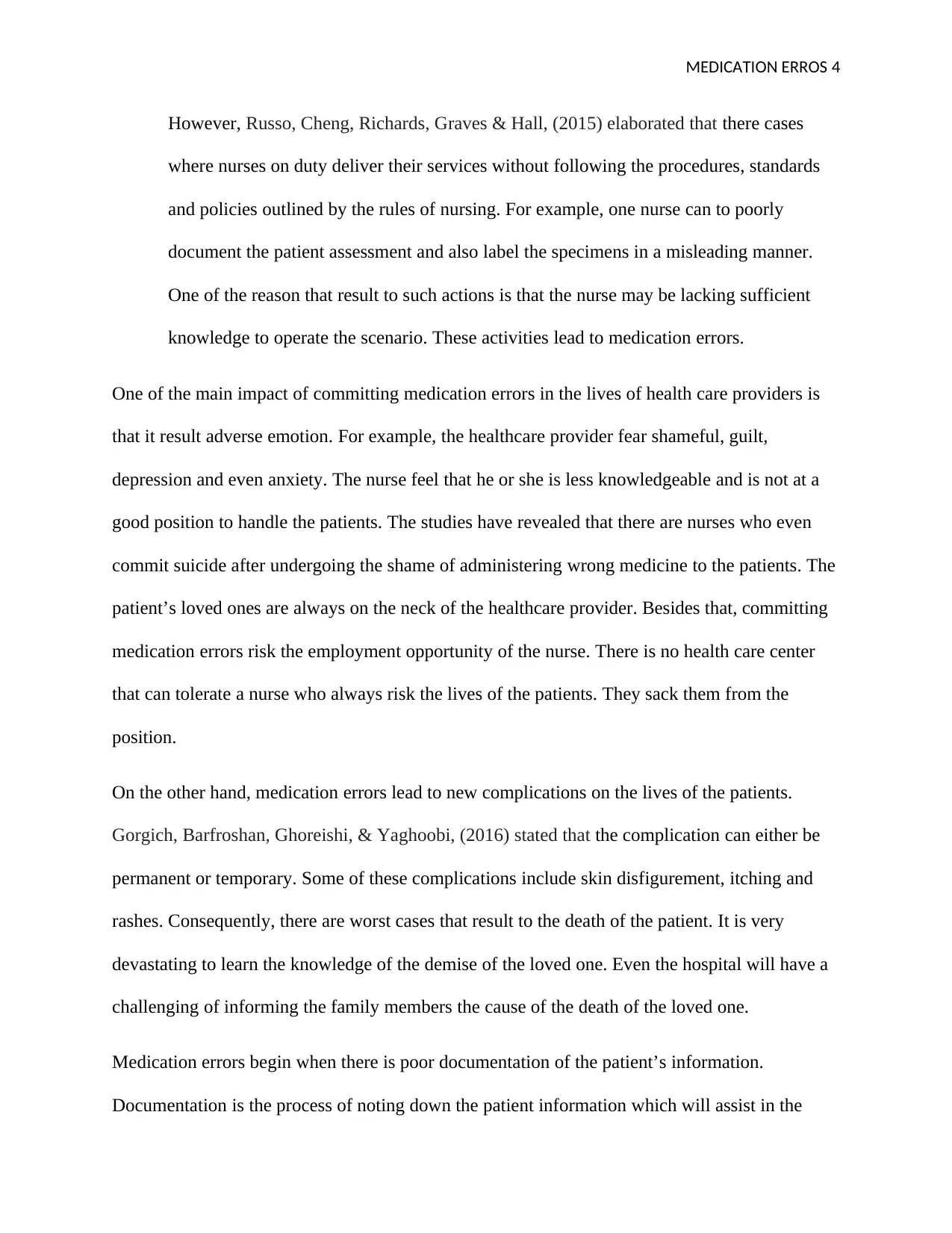
MEDICATION ERROS 4
However, Russo, Cheng, Richards, Graves & Hall, (2015) elaborated that there cases
where nurses on duty deliver their services without following the procedures, standards
and policies outlined by the rules of nursing. For example, one nurse can to poorly
document the patient assessment and also label the specimens in a misleading manner.
One of the reason that result to such actions is that the nurse may be lacking sufficient
knowledge to operate the scenario. These activities lead to medication errors.
One of the main impact of committing medication errors in the lives of health care providers is
that it result adverse emotion. For example, the healthcare provider fear shameful, guilt,
depression and even anxiety. The nurse feel that he or she is less knowledgeable and is not at a
good position to handle the patients. The studies have revealed that there are nurses who even
commit suicide after undergoing the shame of administering wrong medicine to the patients. The
patient’s loved ones are always on the neck of the healthcare provider. Besides that, committing
medication errors risk the employment opportunity of the nurse. There is no health care center
that can tolerate a nurse who always risk the lives of the patients. They sack them from the
position.
On the other hand, medication errors lead to new complications on the lives of the patients.
Gorgich, Barfroshan, Ghoreishi, & Yaghoobi, (2016) stated that the complication can either be
permanent or temporary. Some of these complications include skin disfigurement, itching and
rashes. Consequently, there are worst cases that result to the death of the patient. It is very
devastating to learn the knowledge of the demise of the loved one. Even the hospital will have a
challenging of informing the family members the cause of the death of the loved one.
Medication errors begin when there is poor documentation of the patient’s information.
Documentation is the process of noting down the patient information which will assist in the
However, Russo, Cheng, Richards, Graves & Hall, (2015) elaborated that there cases
where nurses on duty deliver their services without following the procedures, standards
and policies outlined by the rules of nursing. For example, one nurse can to poorly
document the patient assessment and also label the specimens in a misleading manner.
One of the reason that result to such actions is that the nurse may be lacking sufficient
knowledge to operate the scenario. These activities lead to medication errors.
One of the main impact of committing medication errors in the lives of health care providers is
that it result adverse emotion. For example, the healthcare provider fear shameful, guilt,
depression and even anxiety. The nurse feel that he or she is less knowledgeable and is not at a
good position to handle the patients. The studies have revealed that there are nurses who even
commit suicide after undergoing the shame of administering wrong medicine to the patients. The
patient’s loved ones are always on the neck of the healthcare provider. Besides that, committing
medication errors risk the employment opportunity of the nurse. There is no health care center
that can tolerate a nurse who always risk the lives of the patients. They sack them from the
position.
On the other hand, medication errors lead to new complications on the lives of the patients.
Gorgich, Barfroshan, Ghoreishi, & Yaghoobi, (2016) stated that the complication can either be
permanent or temporary. Some of these complications include skin disfigurement, itching and
rashes. Consequently, there are worst cases that result to the death of the patient. It is very
devastating to learn the knowledge of the demise of the loved one. Even the hospital will have a
challenging of informing the family members the cause of the death of the loved one.
Medication errors begin when there is poor documentation of the patient’s information.
Documentation is the process of noting down the patient information which will assist in the
Paraphrase This Document
Need a fresh take? Get an instant paraphrase of this document with our AI Paraphraser
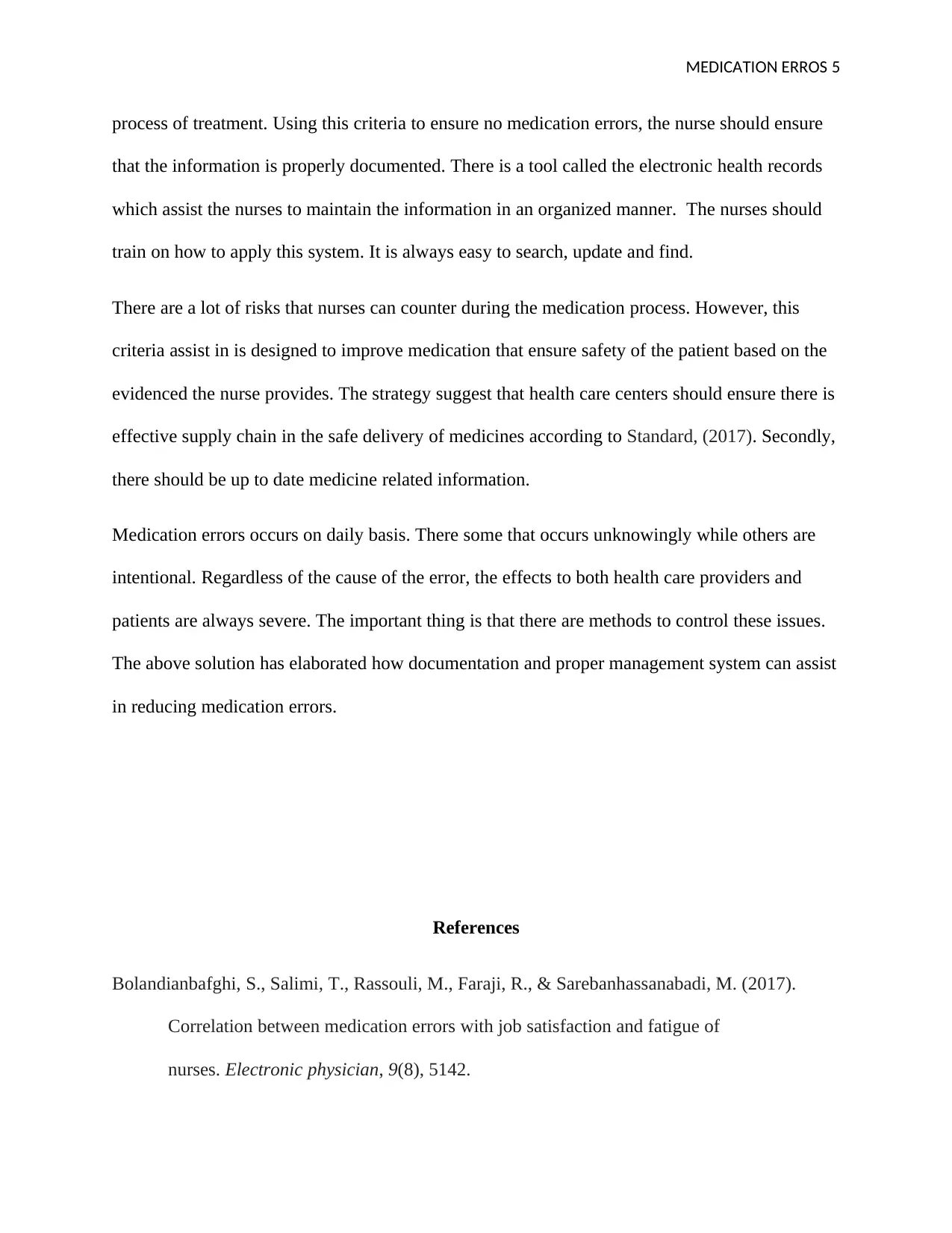
MEDICATION ERROS 5
process of treatment. Using this criteria to ensure no medication errors, the nurse should ensure
that the information is properly documented. There is a tool called the electronic health records
which assist the nurses to maintain the information in an organized manner. The nurses should
train on how to apply this system. It is always easy to search, update and find.
There are a lot of risks that nurses can counter during the medication process. However, this
criteria assist in is designed to improve medication that ensure safety of the patient based on the
evidenced the nurse provides. The strategy suggest that health care centers should ensure there is
effective supply chain in the safe delivery of medicines according to Standard, (2017). Secondly,
there should be up to date medicine related information.
Medication errors occurs on daily basis. There some that occurs unknowingly while others are
intentional. Regardless of the cause of the error, the effects to both health care providers and
patients are always severe. The important thing is that there are methods to control these issues.
The above solution has elaborated how documentation and proper management system can assist
in reducing medication errors.
References
Bolandianbafghi, S., Salimi, T., Rassouli, M., Faraji, R., & Sarebanhassanabadi, M. (2017).
Correlation between medication errors with job satisfaction and fatigue of
nurses. Electronic physician, 9(8), 5142.
process of treatment. Using this criteria to ensure no medication errors, the nurse should ensure
that the information is properly documented. There is a tool called the electronic health records
which assist the nurses to maintain the information in an organized manner. The nurses should
train on how to apply this system. It is always easy to search, update and find.
There are a lot of risks that nurses can counter during the medication process. However, this
criteria assist in is designed to improve medication that ensure safety of the patient based on the
evidenced the nurse provides. The strategy suggest that health care centers should ensure there is
effective supply chain in the safe delivery of medicines according to Standard, (2017). Secondly,
there should be up to date medicine related information.
Medication errors occurs on daily basis. There some that occurs unknowingly while others are
intentional. Regardless of the cause of the error, the effects to both health care providers and
patients are always severe. The important thing is that there are methods to control these issues.
The above solution has elaborated how documentation and proper management system can assist
in reducing medication errors.
References
Bolandianbafghi, S., Salimi, T., Rassouli, M., Faraji, R., & Sarebanhassanabadi, M. (2017).
Correlation between medication errors with job satisfaction and fatigue of
nurses. Electronic physician, 9(8), 5142.
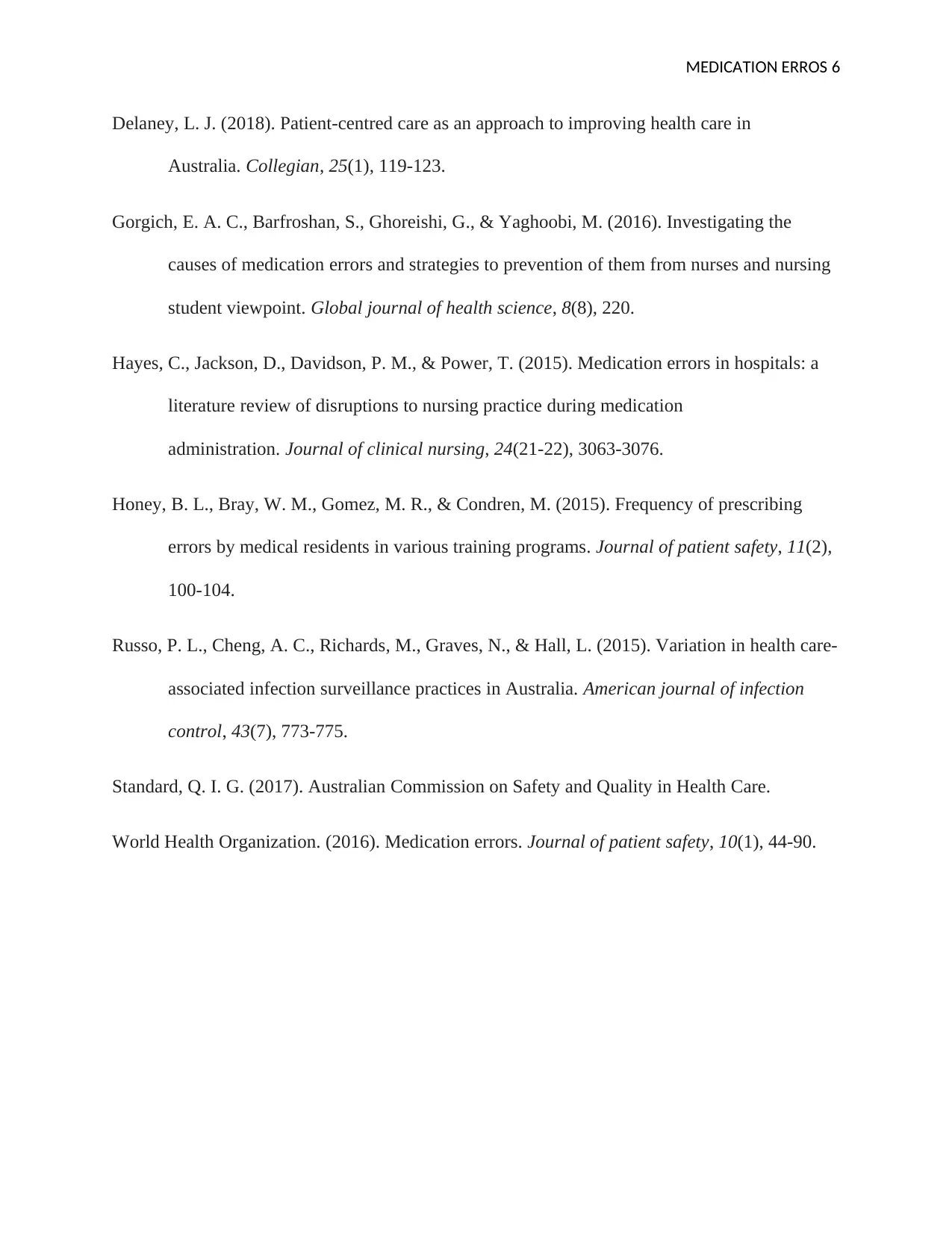
MEDICATION ERROS 6
Delaney, L. J. (2018). Patient-centred care as an approach to improving health care in
Australia. Collegian, 25(1), 119-123.
Gorgich, E. A. C., Barfroshan, S., Ghoreishi, G., & Yaghoobi, M. (2016). Investigating the
causes of medication errors and strategies to prevention of them from nurses and nursing
student viewpoint. Global journal of health science, 8(8), 220.
Hayes, C., Jackson, D., Davidson, P. M., & Power, T. (2015). Medication errors in hospitals: a
literature review of disruptions to nursing practice during medication
administration. Journal of clinical nursing, 24(21-22), 3063-3076.
Honey, B. L., Bray, W. M., Gomez, M. R., & Condren, M. (2015). Frequency of prescribing
errors by medical residents in various training programs. Journal of patient safety, 11(2),
100-104.
Russo, P. L., Cheng, A. C., Richards, M., Graves, N., & Hall, L. (2015). Variation in health care-
associated infection surveillance practices in Australia. American journal of infection
control, 43(7), 773-775.
Standard, Q. I. G. (2017). Australian Commission on Safety and Quality in Health Care.
World Health Organization. (2016). Medication errors. Journal of patient safety, 10(1), 44-90.
Delaney, L. J. (2018). Patient-centred care as an approach to improving health care in
Australia. Collegian, 25(1), 119-123.
Gorgich, E. A. C., Barfroshan, S., Ghoreishi, G., & Yaghoobi, M. (2016). Investigating the
causes of medication errors and strategies to prevention of them from nurses and nursing
student viewpoint. Global journal of health science, 8(8), 220.
Hayes, C., Jackson, D., Davidson, P. M., & Power, T. (2015). Medication errors in hospitals: a
literature review of disruptions to nursing practice during medication
administration. Journal of clinical nursing, 24(21-22), 3063-3076.
Honey, B. L., Bray, W. M., Gomez, M. R., & Condren, M. (2015). Frequency of prescribing
errors by medical residents in various training programs. Journal of patient safety, 11(2),
100-104.
Russo, P. L., Cheng, A. C., Richards, M., Graves, N., & Hall, L. (2015). Variation in health care-
associated infection surveillance practices in Australia. American journal of infection
control, 43(7), 773-775.
Standard, Q. I. G. (2017). Australian Commission on Safety and Quality in Health Care.
World Health Organization. (2016). Medication errors. Journal of patient safety, 10(1), 44-90.
⊘ This is a preview!⊘
Do you want full access?
Subscribe today to unlock all pages.

Trusted by 1+ million students worldwide
1 out of 6
Related Documents
Your All-in-One AI-Powered Toolkit for Academic Success.
+13062052269
info@desklib.com
Available 24*7 on WhatsApp / Email
![[object Object]](/_next/static/media/star-bottom.7253800d.svg)
Unlock your academic potential
Copyright © 2020–2026 A2Z Services. All Rights Reserved. Developed and managed by ZUCOL.





